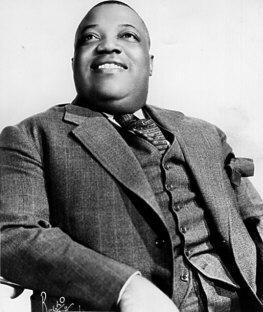
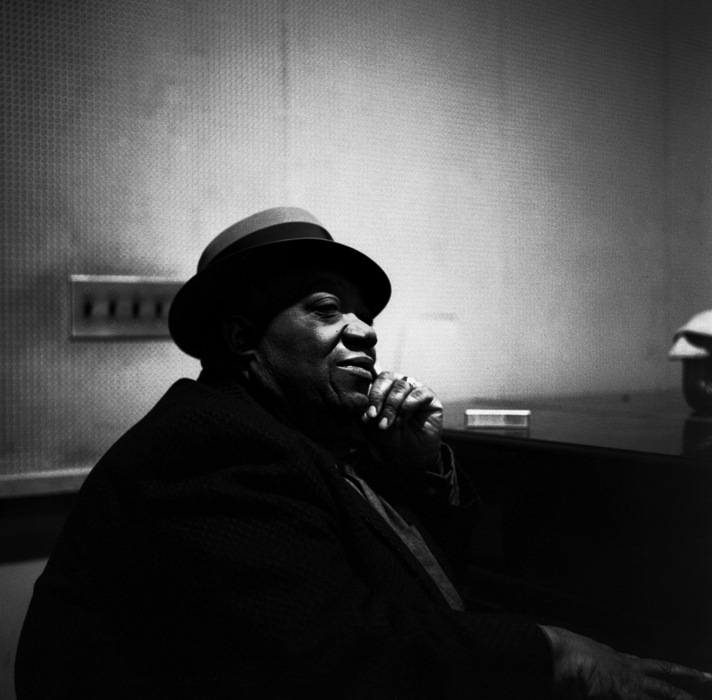
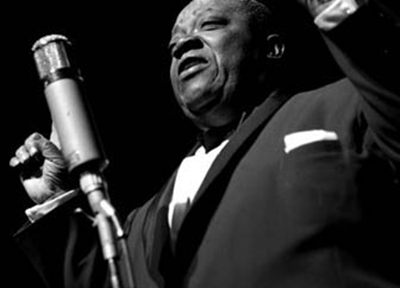
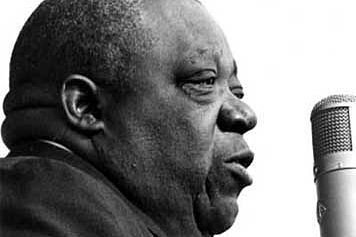
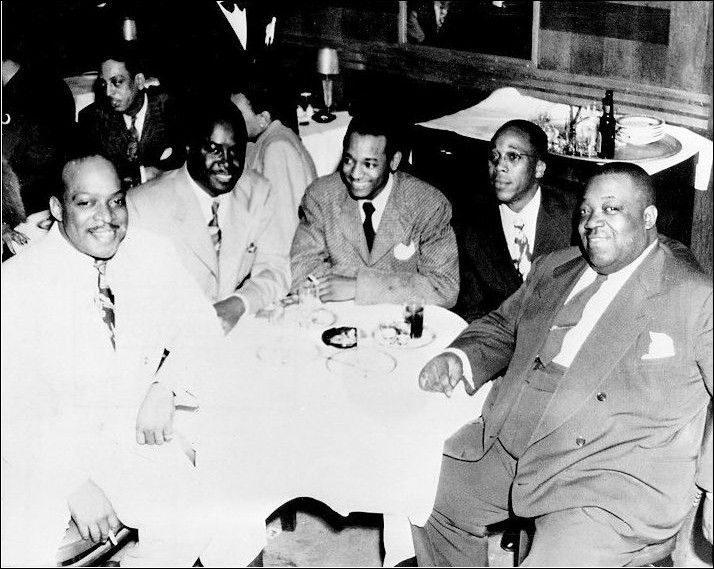
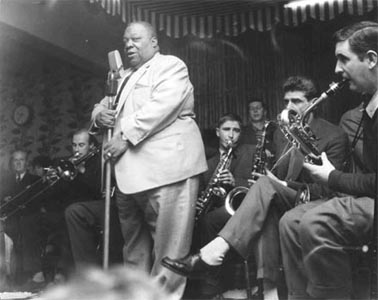
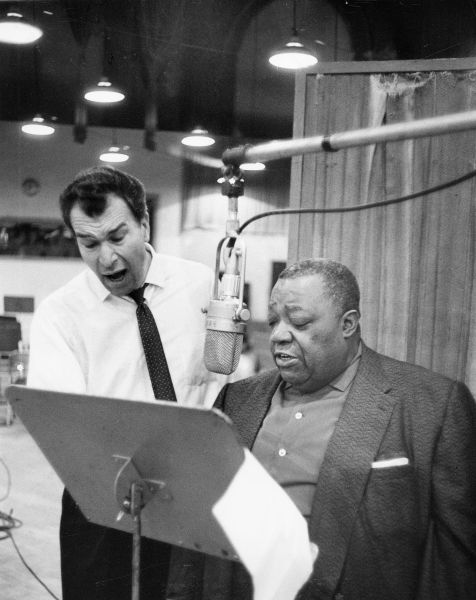
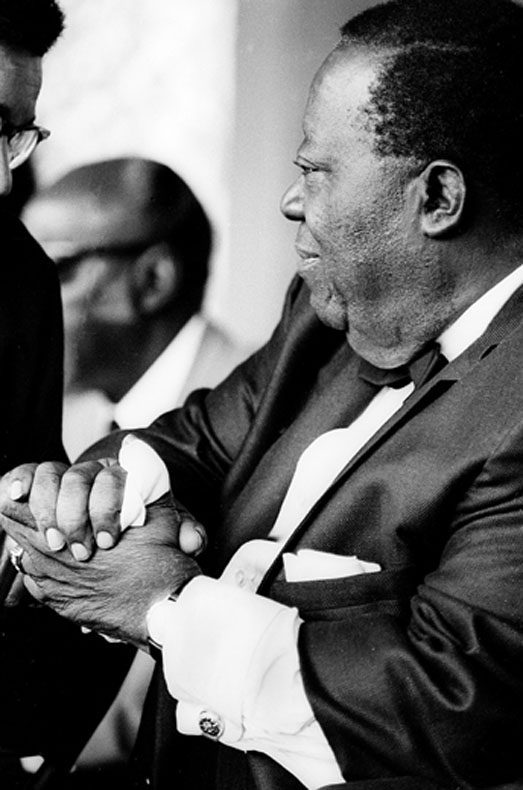
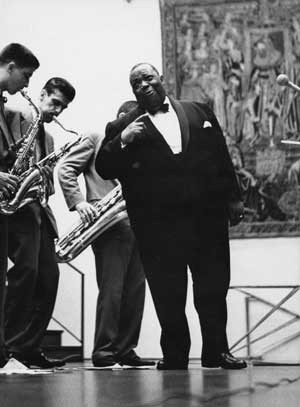
"Jimmy Rushing"
James Andrew Rushing (August 26, 1903 - June 8, 1972) From Oklahoma City, Oklahoma, Featured vocalist of Count Basie's Orchestra from 1935 to 1948.









"Jimmy Rushing"
James Andrew Rushing (August 26, 1903 - June 8, 1972) (known as Jimmy Rushing) was an American blues shouter and swing jazz singer from Oklahoma City, Oklahoma, best known as the featured vocalist of Count Basie's Orchestra from 1935 to 1948.
Rushing was known as "Mr. Five by Five" and was the subject of an eponymous 1942 popular song that was a hit for Harry James and others. He joined Walter Page's Blue Devils in 1927, then joined Bennie Moten's band in 1929. He stayed with the successor Count Basie band when Moten died in 1935.
Rushing was born in Oklahoma City, Oklahoma, on August 26, 1903, into a family with musical talent and accomplishments. His father, Andrew Rushing, was a trumpeter and his mother and brother were singers. Young Jimmy took to the family vocation and was a success, touring the Mid-West and California as an itinerant blues singer in the years 1923 and 1924 before moving to Los Angeles, California, where he sang with Jelly Roll Morton. Rushing got a gig singing with Billy King before moving on to Walter Page's Blue Devils in 1927. He, along with other members of the Blue Devils, defected to the Bennie Moten band in 1929.
Moten died in 1935, and Rushing joined Count Basie for what would be a 13-year gig. Due to his tutelage under his mentor Moten, Rushing was a proponent of the Kansas City jump blues tradition, best evidenced by his performances of "Sent For You Yesterday" and "Boogie Woogie" for the Count Basie Orchestra. After leaving Basie, his recording career soared, as a solo artist and a singer with other bands.
When the Basie band broke up in 1950 he briefly retired, then formed his own group. He also made a guest appearance with Duke Ellington for the 1959 album Jazz Party.
His build earned him a nickname and a signature song, "Mr. Five by Five" ("he's five feet tall and he's five feet wide"). His best known recordings are probably "Going to Chicago" with Basie, and "Harvard Blues", with a famous saxophone solo by Don Byas.
Rushing was a powerful singer who had a range from baritone to tenor. He could project his voice so that it soared over the horn and reed sections in a big-band setting. Count Basie claimed that Rushing "never had an equal" as a blues vocalist. George Frazier, author of "Harvard Blues", called Rushing's distinctive voice "a magnificent gargle".
After he became ill with leukemia in 1971, Rushing's performing career ended. He died on June 8, 1972, in New York City, and was buried at the Maple Grove Cemetery, Kew Gardens, in Queens, New York.
Jimmy Rushing (James Andrew Rushing)
born: 26. August 1901 (oder 1903 oder 1902), Oklahoma City, Oklahoma/USA
died: 8.June 1972, New York, New York/USA
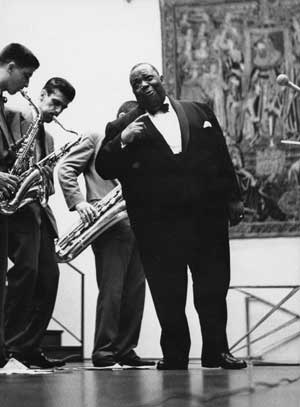 Jimmy
Rushing is known for his full voice possessing a high degree of individuality
hardly to be found with any other blues or jazz singer of the period. He actually is a tenor, but the sonority of his voice
makes him sound more like a baritone. Rushing's mother was a church organist, his father played trumpet. Rushing himself had had
a musical education, could play the violin as well as enough piano to be able to accompany himself. In Los Angeles he had
performed at private parties together with pianist Jelly Roll Morton. In 1925 and from 1927-29 he toured with the Blue Devils
Band of bassist Walter Page, in 1929 became a member of the Bennie Moten Orchestra in Kansas City. In Moten's band Rushing was
not mainly responsible for the blues, but rather for the lyrical ballads. His voice shaped the sound of the Count Basie
Orchestra when the pianist took over the Moten band after the leader's death in 1935. Basie preferred a repertoire of strongly
blues influenced pieces, whether original blues tunes or sentimental songs with a blues tinge. Rushing, affectionately known as
"Mr. Five by Five", had a couple of popular successes with Basie in the late 1930s and 1940s, among them titles like "Evening'"
(1936), "Good Morning Blues" (1937), "I Want a Little Girl" (1940), "Goin' to Chicago Blues" and "Harvard Blues" (1941). He
stayed with Basie until 1950, then led his own septet for two years performing at New York's Savoy Ballroom. In the 1950s and
1960s he recorded albums with swing musicians in the mainstream style of the period, working together with the likes of Buck
Clayton, Joe Newman, Buddy Tate and others. In 1958 he toured with Benny Goodman, in 1960 he sang with the Dave Brubeck Quartet
at New York's Basin Street East.
Jimmy
Rushing is known for his full voice possessing a high degree of individuality
hardly to be found with any other blues or jazz singer of the period. He actually is a tenor, but the sonority of his voice
makes him sound more like a baritone. Rushing's mother was a church organist, his father played trumpet. Rushing himself had had
a musical education, could play the violin as well as enough piano to be able to accompany himself. In Los Angeles he had
performed at private parties together with pianist Jelly Roll Morton. In 1925 and from 1927-29 he toured with the Blue Devils
Band of bassist Walter Page, in 1929 became a member of the Bennie Moten Orchestra in Kansas City. In Moten's band Rushing was
not mainly responsible for the blues, but rather for the lyrical ballads. His voice shaped the sound of the Count Basie
Orchestra when the pianist took over the Moten band after the leader's death in 1935. Basie preferred a repertoire of strongly
blues influenced pieces, whether original blues tunes or sentimental songs with a blues tinge. Rushing, affectionately known as
"Mr. Five by Five", had a couple of popular successes with Basie in the late 1930s and 1940s, among them titles like "Evening'"
(1936), "Good Morning Blues" (1937), "I Want a Little Girl" (1940), "Goin' to Chicago Blues" and "Harvard Blues" (1941). He
stayed with Basie until 1950, then led his own septet for two years performing at New York's Savoy Ballroom. In the 1950s and
1960s he recorded albums with swing musicians in the mainstream style of the period, working together with the likes of Buck
Clayton, Joe Newman, Buddy Tate and others. In 1958 he toured with Benny Goodman, in 1960 he sang with the Dave Brubeck Quartet
at New York's Basin Street East.
Jimmy Rushing belongs among the most important singers in jazz. His voice is clearly different from the rural, musically uneducated blues musicians whose style often compare more to declamation than singing. His exact phrasing gives his interpretations a certain clearness even when he paraphrases, when he changes single notes into little melismatic melodies. Rushing uses a technique of African American singing developed in the blues as well as the religious musical traditions: "shouting", a sudden start of a phrase, often begun on a high and especially loud note, then falling dynamically as well as melodically, often being repeated to further strengthen the intensity of its effect. One good example of his technique can be heard in "Harvard Blues" from 1941. The lyrics here do not refer to cliché formulas of the blues tradition but rather to a non-blues world – the student scene of Harvard University would be hardly accessible for a Black person at that time. The recording begins with two solo choruses of tenor saxophonist Don Byas. Jimmy Rushing follows with two choruses using the usual 12 bar a-a-b text structure. He then sings a very effective shout chorus over the lines "Reinhardt, Reinhardt, I'm a most indifferent guy", accompanied by some pretty unconventional blues harmonies written for the band by arranger Tab Smith. The orchestra ends the recording with an instrumental chorus. Rushing's heir in the Basie Orchestra was Joe Williams, who came from different roots as a ballad and blues singer, was influenced more by singer/bandleader Billy Eckstine. [Wolfram Knauer]
PS: The differing birth dates come from different sources provided by Rushing himself on several occasions (interviews etc.). The year 1901 is given on the social security application form he filled out in 1936 which can be seen in facsimile on the Rushing website (see below).
Encyclopedia entries:
no year given:
1954:
1956:
1957:
1958:
1959:
1960:
1961:
1962:
1963:
1964:
1965:
1966:
1967:
1969:
1971:
1972:
1973:
1974:
1981:
1982:
1984:
1985:
1989:
1993:
1997:
1998:
1999:
2000:
2001:
2002:
2004:
2005: